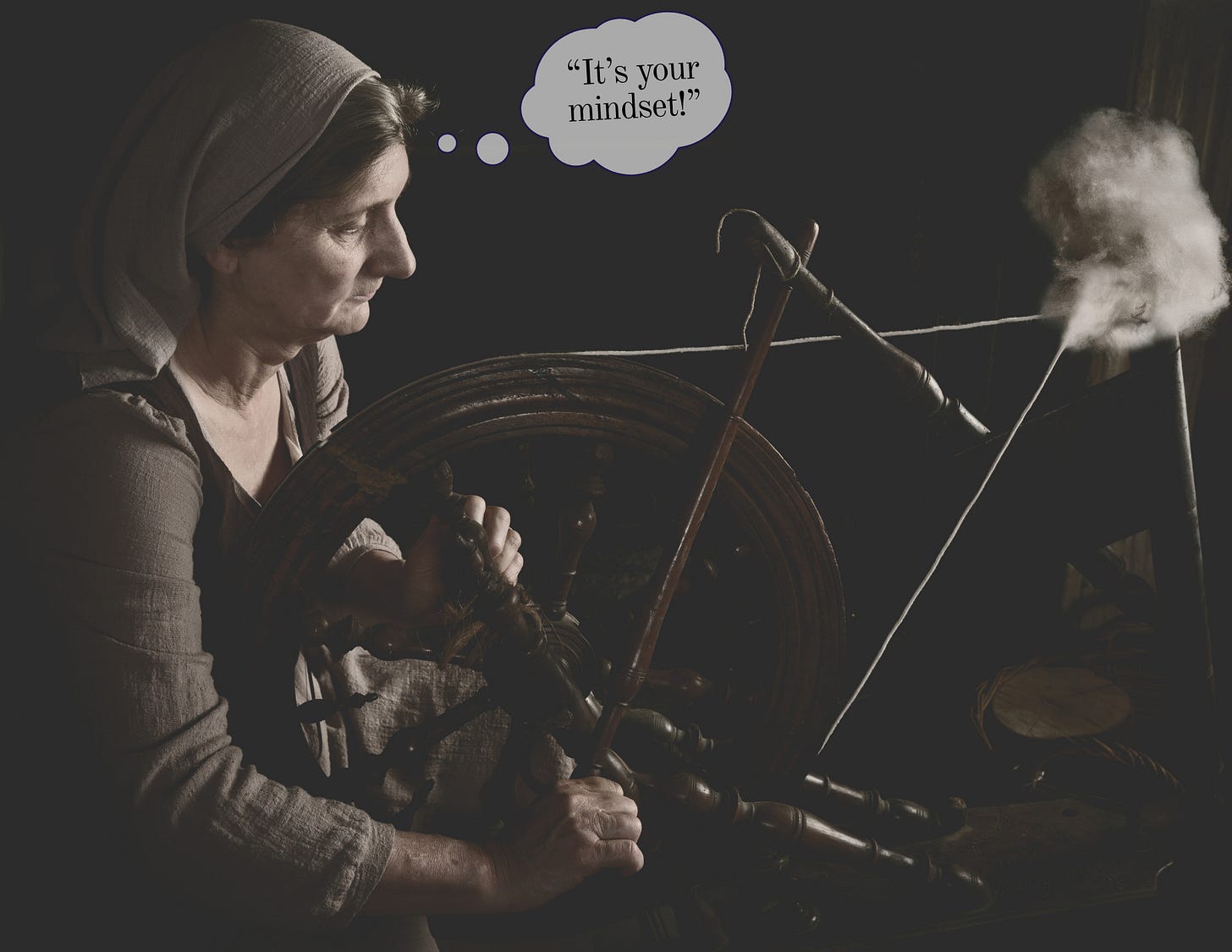The Trauma Spin Cycle: Schubert, Sleeping Beauty, and the Coaching Industry’s Favorite Spell
From Schubert’s "Gretchen am Spinnrade" to Aurora’s Curse: Why Coaching’s Favorite Lines Trap You in a Loop You Can’t Exit
Some of the Most Insidious Gaslighting Isn’t Loud—It’s Coached
When I wrote “You’re Not Working,” I was naming a cultural gaslight that too many artists, entrepreneurs, and survivors know way too well.
It’s what gets hurled at you when your labor doesn’t look visible enough. When you’re building, healing, thinking, or recovering—and someone else decides that must not count. Maybe it doesn’t look as “hard” as their work. Or maybe they think they could do it better—or that you’re too “privileged” to ever really struggle in the first place.
But there’s a quieter, more insidious version of that same dismissal…
It doesn’t come from your family, friends, colleagues, strangers, or even the people you hate.
It comes from the coach you hired to help you rise—or the online influencers and gurus they’re trying to sound like.
When the going gets tough, or when you start to ask thoughtful questions, they repeat the same refrain.

"It’s Your Mindset!”
This is the coaching industry’s favorite refrain when it comes to invalidating your discernment—or even the actual logistics in your life.
Feeling stuck? It’s your mindset.
Questioning the strategy? It’s your mindset.
Don’t have any money to invest? Mindset.
Don’t have anyone to loan you the money? Definitely mindset.
Does this 5-month group coaching program that costs $15K feel suspicious? Then you clearly have a “lack mindset” holding you back!
Just like “You’re not working” denies the value of your invisible labor,
“It’s your mindset!” denies the legitimacy of your ability to think clearly for yourself as well as your actual life circumstances.
It frames every hesitation as fear.
Every boundary as resistance.
Every informed “no” must be a “trauma response” they need to fix for you.
Because if you just had an “abundant mindset,” you’d already “invest in yourself.”
And just like that, you’re no longer a person with perspectives and lived experiences.
You’re a “case.” And they may claim to be the only one who can solve it.
At this point, it’s not about helping. It’s about creating a narrative where your doubt becomes their diagnostic tool. Your pain becomes their proof of concept.
You just gotta “change your mindset”—and manifest that $15K like your life depends on it.
It’s a tale as old as time: like Aurora drawn to the spindle, we’re lured by what promises transformation—only to be pierced by the very wheel we thought would save us. And then, like Gretchen, we get stuck at the spinning wheel—and our only hope is for Schubert to write a famous art song about it.
🎵 Enter: “Gretchen am Spinnrade”
Schubert’s famous lied Gretchen am Spinnrade (Gretchen at the Spinning Wheel) is the perfect metaphor for the emotionally manipulative “It’s your mindset!” feedback loop that’s prominent in modern coaching.
If you want to understand how emotional pain can be aestheticized and mistaken for transformation, you don’t need to look at the coaching industry first.
Let’s go back over 200 years to one of Schubert’s first prominent pieces. Like his Erlkönig, the text is by Goethe, and it’s more than just another masterwork, it’s a blueprint for how longing, obsession, and unresolved desire can be rendered musically—and psychologically—into a loop so compelling that you almost forget it's a trap.
🧵 The Setup:
Gretchen is alone. Abandoned. Desperate for connection.
She sits at her spinning wheel, lost in thoughts of the man who left her.
And Schubert did something some would call revolutionary for his time: the piano accompaniment set the mood, painted the scene, and literally became the spinning wheel.
The right hand: a hypotic repetitive motive of arpeggios with passing tones resembling the relentless spinning.
The left hand: the foot treadle—steady, repetitive, grounding, and imprisoning all at once.
From the very first bar, it’s like we’re not just watching Gretchen—we’re physically with her. We’re witnessing live a body that can’t stop moving, and a mind that can’t let go.
She’s not working. She’s spiraling.
She sings:
“Meine Ruh’ ist hin, / “My peace is gone,”
”mein Herz ist schwer.” / “my heart is heavy.”
And we feel it.
Because the music is doing what the text alone cannot: trapping us with her.
The Emotional Arc:
As Gretchen sings, she’s reliving her love for him—the way he looked, the way he spoke, the way she used to feel.
The harmony slowly climbs.
The textures swell.
The tension builds toward the most passionate, ecstatic peak in the song:
“Und ach, sein Kuss!” / “And oh, his kiss!”
It feels like something is about to break open.
Like the wheel might stop for good.
Like something might finally change.
The accompaniment beneath the word “Kuss” starts out in a first-inversion dominant-seven chord before it becomes an even more dissonant fully diminished seventh chord. We go from a chord that traditionally promises resolution—to one that deepens the dissonance.
It sounds like the music might break through.
But it doesn’t transform.
After a slight pause,
the music just finds its way back into the original motif and melody.
Same accompaniment.
Same key.
Same wheel.
Nothing resolves. Nothing moves forward. Nothing is integrated.
This is not catharsis.
This is not transformation.
This is trauma masquerading as climax—a loop disguised as a breakthrough.
And like a fairy tale, the illusion is beautiful—until it bleeds.
And we’ve learned to mistake it for progress.
This is exactly what many in the coaching industry will try to sell you. Because where music has long been a vehicle for resolving emotional tension, some modern business spaces now do the opposite. They manipulate that same tension—stretch it, dramatize it, commodify it—not to move you forward, but to keep you circling.
When Coaches Sell the Spell…
Just like Aurora in Sleeping Beauty, the client is lured toward the very thing that will harm her—under the illusion that it holds power, transformation, or destiny.
She doesn’t resist the wheel.
She’s drawn in by its promise.
Just like her finger is drawn to the spindle—not by force, but by trance—the client isn’t pushed into the sale with pressure, but pulled in with “data” (e.g. a misleading “ROI calculator”) wrapped in fantasy.
It’s not a sales call. It’s an enchanted forest disguised as one—with no exit in sight.
And that’s exactly how it works for these manipulative coaching containers:
You’re not coerced with force.
You’re mesmerized by the story.
Because if they can make “six or seven figures” selling a dream,
then why can’t you do the same?
They don’t sell strategy. They sell spells—and call it strategy.
The enchantment works because it mirrors effort—without ever offering an exit.
Spinning feels like doing. That’s how the illusion works—it mimics movement, while robbing you of momentum.
And by the time the story turns sharp—by the time your finger bleeds—you’re already inside it.
Just like a dominant-seven chord with no resolution…
…they keep you suspended.
Not because they can’t resolve you.
But because they profit more by keeping you spinning.
They spotlight your “wounds” just long enough to activate urgency.
But not long enough to help you reintegrate.
You’ll hear:
“This is your childhood wound.”
“That’s your financial trauma.”
“Your hesitation is a freeze response.”
“You have an abandonment pattern that’s making you avoid investing more.”
Suddenly, your trauma is no longer a source of hard-won wisdom or strength.
It’s a sales hook.
Something to be evaluated, interpreted, and used to justify the price of admission.
You’re not a client—you’re a conversion.
And once you prick your finger, they keep you “sold” on their solution to repair the wound, and you don’t even notice you keep pricking your finger over and over.
And the wheel keeps on spinning.
The Cycle: Trauma Turned into a Business Model.
Let’s name what’s really happening here:
They trigger unresolved emotion with language that sounds therapeutic—but isn’t.
They interpret your hesitations as pathology instead of perspective.
They withhold clarity and resolution, so you keep coming back for the next hit of insight, the next “activation,” or the next round of “coached catharsis.”
This is not healing.
This is aestheticized limbo—
emotional suspense marketed as personal growth.
And it’s no accident.
The business model depends on unresolved tension.
That’s how they keep you hooked.
That’s how they make sure your nervous system stays dependent on their voice.
And when you try to walk away?
They say:
“You weren’t ready.”
“You’re avoiding the work.”
“You’re in resistance.”
Or worse—“We must have activated something.”
As if your departure is further proof of your brokenness.
As if the spin itself is sacred.
It’s not.
When Strategy Becomes Performance
So many artists and entrepreneurs feel like they’re working harder than ever—but still not moving.
There’s one more reason Gretchen am Spinnrade can feel so familiar—especially if you've been in the online business or coaching world for more than five minutes:
Because the coaching industry doesn’t just trap you in emotional loops.
It traps you in strategic theatre.
You start out wanting to sell your work…
and end up performing your worthiness.
The way you show up online
The way you speak on sales calls
The way you write your bio
The way you price your offer
Even the timing of your pitch
—all becomes part of a carefully constructed persona
designed to convince someone you deserve to be paid.
A lot of what's sold as "business strategy" is really just a repackaged set of performance rules for how to act like someone who thinks they deserve money.
This is the real hidden cost of gurus saying “just give people what they want” or “make sure you don’t pitch too fast.”
It’s not advice—it’s choreography.
And when your strategy becomes performance, you don’t just question your skills.
You start questioning your self.
“Was I too much?”
“Was I not polished enough?”
“Did I show too much fear?”
“Was that post too emotional… or not emotional enough?”
You’re not building a business anymore.
You’re auditioning for belonging.
Except in this circumstance this kind of “Erl King“ will make any audition worthy of admission so long as you pay the price.
Especially if you’re an artist or a singer—
you already know what it feels like to audition for approval.
You didn’t think you’d have to do it again… just to be allowed to earn.
But here we are…
(And this is why I wrote my “Erl-King Trilogy”):
Now—Here’s the Truth that Doesn’t Get Said Enough:
IF YOU’RE AN EXPERIENCED ENTREPRENEUR with history, traction, and tools or resources in place, then stretching your capacity to invest can absolutely be a legitimate entrepreneurial exercise—but a calculated discomfort.
Because high-ticket investments do sometimes require courageous mindset shifts, and they can be what you need to push your self to generate more revenue and expand your risk tolerance—often so you can sell at higher prices with even more confidence—It worked for You Are A Badass author Jen Sincero.
If someone is actually ready to receive hundreds of thousands or even millions in real business revenue, a significant five- or six-figure investment with the right mentor(s) would be appropriate.
But way too often, what starts as a mindset tool for the seasoned… gets misused as a financial mandate for the unprepared.
And here is where it can turn even more harmful: There are coaching programs that claim to be “trauma-informed,” but will use emotional manipulation to push you into making financial decisions beyond your capacity. Too many have watched a few online videos, grabbed a certificate, and now play psychologist—without training, boundaries, or accountability.
And if you're new to entrepreneurship—and you convince Grandma to pull from her retirement savings so you can join a high-ticket group promising '“financial freedom” in 5 months—but you still can’t afford rent, groceries, or backend tools?
That’s not expansion. That’s collapse.
And when the formulaic strategy doesn’t work?
When the clients don’t come?
When you start to panic?
Grandma will say:
“The business is a failure. Get a real job! And pay me back.”And the coach will say:
“The business is fine. It’s your mindset! (Now pay me more.)”
Because the program was never designed to work without infrastructure.
It wasn’t built for someone with no savings, no margin, and no support.
But that’s only revealed in the form of a lived experience after you’ve paid!

When False Binaries Masquerade as Business Advice
Fear-based messaging exploits the same trauma loops it claims to solve.
You may have seen the ads:
“These 6 words could be the difference between making 6 figures and losing it all.”
“If your copy doesn’t convert, you’ll waste your entire ad spend.”
“Use these subconscious hacks to repel broke and lazy leads.”
At first glance, it just looks like another overhyped business toolkit.
But listen a little closer—like a musician hearing a wrong chord in an otherwise polished phrase—and the manipulation becomes obvious.
This isn’t strategy.
It’s fear, but dressed as precision.
🔍 What’s really happening in ads like this?
They create false stakes.
As if the entire outcome of your business hinges on just one skill: copywriting, Instagram reels, ad placement, email campaigns, or website flow.
No mention of offer structure, capacity, pricing, trust-building, or systemic barriers.
Just a tight little phrase:
“Say the wrong words, lose everything.”
That’s not advice—it’s emotional blackmail.
They make the stakes feel binary: invest or implode!
They collapse nuance into urgency.
As if there are only two outcomes:
Multiply your income… or lose your life savings.
No room for iteration, no space for discernment—just a cliff.
They teach you to fear your own clarity.
You’re not encouraged to think.
You’re taught to copy.
To perform.
To obey.
In other words:
To spin.
🎭 This Is Theatre as Strategy—Again!
Most marketing gurus were rewarded for performance, so they assume performance is the only path—even the “nice” ones.
And just like the coaches who activate your trauma to sell you back your worthiness,
their ads activate your fear to sell you a false sense of control.
You’re not making decisions from clarity.
You’re reacting from a nervous system that’s been told it’s always one sentence away from disaster.
This is what happens when strategy is divorced from structure:
You’re sold the performance of control—
instead of the power of congruence.
🎵 And Again… the Phrase Doesn’t Resolve.
You buy the toolkit.
You follow the script.
You tweak the hook.
You chase the metric.
And even if the framework feels ethical…
Even if it’s built on trust and service…
If the business underneath it all still doesn’t feel aligned—
If it still doesn’t match how you work, who you are, and what you actually offer—
If it still quietly asks you to perform—
Then you’re not really building a client journey.
You’re just spinning with fancier language.
And you feel it.
Because the phrase never resolves.
You’re constantly preparing.
Tweaking.
Holding your breath.
Waiting for a downbeat that never lands.
Just like Gretchen at the spinning wheel.
And until you stop spinning and start calibrating—
The resolution never comes.
🎶 Musicians, You Know This Sound
You’ve trained your ears to hear false cadences.
You know when a modulation is real—and when it’s just a detour back to the same tonic.
You know the difference between a delayed resolution that serves the art…
and a prolonged dissonance that serves only itself.
So why are we pretending we can’t hear it in business?
Why are we calling it healing
when it’s actually more of a performance?Why are we calling it coaching
when it’s more like a form of coercive control—
looped and layered in therapeutic vocabulary?
🎼 There’s Another Way: Music that Moves More.
Where Schubert traps Gretchen in her spinning motif, other composers show us a different path.
Take Clara Schumann’s “Er ist gekommen in Sturm und Regen.”
Same longing. Same romantic tension.
But the piano feels more like a vehicle driving things forward, not just around the same territory.
The phrases lengthen.
The emotional peak feels earned—and integrated.
The piece doesn’t end where it began.
There is choice.
There is motion.
There is agency.
That’s the difference between trauma as art—and trauma as bait.
You Deserve More than Catharsis Loops
You deserve more than wheel-spinning disguised as healing.
You deserve mentorship that doesn’t perform your pain or package your nervous system into a 5-month (or 5-week or 5-day or 5-minute) funnel.
The best music doesn’t just hold tension.
It knows how to resolve it—without erasing the story.
The same is true for business.
So no—it’s not always your mindset.
Sometimes, it’s your gut telling you:
You’ve already heard this chord progression.
You know how it ends.
And it’s time to walk away from the wheel.
Don’t just leave the wheel.
Reclaim your rhythm.
Choose a cadence that’s actually yours.
Because the best music for you shouldn’t just circulate.
It should modulate.
It should resolve.
And it should leave you with a cadence you can carry—
not just a feeling you can’t explain.
When Aurora wakes, she doesn’t remember the trance.
When Gretchen sings, she doesn’t leave the wheel.
But you can choose a rhythm that actually moves where you want to go.

🧵THE CODA: 🚩🚩🚩RED FLAGS, NOT NICETIES
Common Coaching Phrases that Don’t Resolve Anything—But Will Keep Your Wheel Spinning
The following aren’t just emotionally suspicious catchphrases—they are red flags that can reveal coaching and teaching business models built on emotional dependence. When these phrases show up in place of actual diagnostic clarity or structural support, they’re not signs of healing. They’re signs you’re being sold back your own nervous system on a payment plan.
And these phrases are everywhere in the coaching world.
They may sound wise, caring, or empowering.
But when used without follow-through, context, or structure—they’re not support.
They’re emotional control in disguise.
Used repeatedly, they may not offer insight—
they may offer compliance.
If you’ve ever felt that you almost broke through—but ended up exactly where you started… this is why you might feel like Gretchen at the spinning wheel.
🚩 Emotional Theater That Sounds Like Presence—But Isn’t
“I see you.”
Peekaboo! For some, this overused phrase might be a harmless habit. But in too many coaching spaces, it’s a cheap way to manufacture trust—or keep clients contained. It’s often used reflexively, performatively, and mistaken for presence. It may feel validating—but it usually ends there.Unless it’s paired with real insight or tangible support, you’re better off treating it like a synonym for “yes”—and nothing more. Especially on social media. And if they’re always typing “ICU” or tossing out cutesy gifs and memes—especially as coaches—it might be time to tell your intuition: ”I see you!” And run.
“Let that land.”
Dramatic pause designed to make something sound profound—even if it wasn’t.“Take a breath.”
Co-opted calm. Sometimes we need a reminder to breathe. Other times, it might be a technique to settle your nervous system just enough to stay silent.“What’s coming up for you right now?”
A valid question if in a structured context or followed by appropriate action. Otherwise, it’s filler—or a chance for them to pry more info out of you to close the sale or to prep for the high-ticket upsell.
🚩 Sayings that Masquerade as Psychology
“That’s just your trauma talking.”
No, that might be your discernment. This phrase is a classic deflection used to discredit a legitimate ‘no.’ “Core wound” gets misused in this context also.“This is just your upper limit.”
Translation: your hesitation is a problem, not a signal.“You’re afraid of your own power.”
Sounds uplifting—used to dismiss boundaries and speed up your buy-in.“This is where most people give up.”
Framed as motivation. But it’s really a guilt trip or a shame cycle.“This is the work.”
A catch-all phrase to justify emotional overwhelm or unclear delivery.
🚩 Spiritualized Bypassing That Shuts Down Inquiry
“Don’t ask how.”
Protects a broken strategy behind mystical branding.“You don’t need to know how. Just decide.”
A push toward investment without regard for bandwidth, finances, or readiness.“Our job is to choose—God’s job is the ‘how.’”
A common coaching cliche that gets misused when there’s no structure—nor even a map to follow.“God doesn’t call the qualified—He qualifies the called.”
Manipulates your sense of purpose to override common sense.“This came to you for a reason.”
A karmic sales pitch. Conveniently always applies right before the invoice.
🚩Shame-Framed Empowerment—It’s Actually Sales Pressure
“Are you in integrity with the version of you you’re becoming?”
Weaponizes identity. Implies that saying "no” is self-betrayal.“You’re the only one in your own way.”
Ignores structural issues or misaligned strategy—puts all blame on you.“You’re not working—your nervous system is.”
Romanticizes collapse instead of solving for it.“I’m not here to convince you.”
Always said right after they’ve spent 45 minutes doing exactly that.
🚩 And the Most Abused One of All:
“It’s your mindset.”
The coaching world’s favorite gaslight.
If their offer doesn’t fit, if their process falls short, if you can’t fit the funnel formula, or if their price is unworkable—
it must be your fault.
If you just invest to fix your mindset, you’ll automatically fix your life—and their business model depends on you believing it.
🎵 From Gretchen to Aurora:
These aren’t neutral affirmations.
They’re not harmless motivational fluff.
Too much of what we often hear coaches say are rehearsed scripts designed to close the sale, protect the container, and keep you spinning instead of thinking.
They don’t resolve your pain—or not entirely.
They loop it.
And they label your resistance as pathology—so you buy your way back into the cycle.
🎼 If it swells like a dominant seventh,
but never resolves...
it’s not support.
It’s a sales tactic.
If the phrase repeats…
If the coach won’t explain…
If the wheel keeps spinning but the result never changes—
It’s not a mindset issue.
It’s a design flaw.
When Aurora wakes, she doesn’t remember the trance.
Most coaching clients don’t either.
But their bank account does.
Their nervous system does.
Their relationship with money and trust?
Their bank account still bleeds long after the spell is broken.
You don’t need an unusual prince.
But you do need your gifts returned—
your rhythm, your reason, and your voice.
And when you have those?
You’ll never spin again just to be saved.
You’ll realize your dreams on your terms.
And If This Essay Resonated…
Please take a moment to read (or reread) and share (or reshare)
The Referral List I Wish School Had Given You.
It’s a vetted list of mentors who meet structural standards most people were never taught to name—and it can help you avoid the very traps my essays expose.
Share it with students looking for guidance.
Share it with professors, advisors, and colleagues who make referrals.
Share it not just for the remarkable people featured—
but for the standards alongside them.
Standards rooted in economic integrity.
And human decency.
And if someone finds the standards or the list confronting—
They might not be reacting to the list—
They might be revealing their own playbook.
Much gratitude for reading!
Most readers stop here, feeling seen…
Others may want to explore what my work could mean for their business, curriculum, or leadership strategy:
If this article hit a little too close to home, and you want to do something about it—or if you're quietly reevaluating your business, curriculum, or leadership model—it might be time for a private recalibration.
I’m currently accepting Elite 1:1 private client applications, and I’m offering a limited number of VIP Strategy Days and individual diagnostic sessions—DM me for more info.
No public confessions required. No performance necessary. Just clear, honest work on the system you’ve built (or inherited)—so it actually works for you.
My work may be a fit for those who:
• Run a business
• Manage a high-performance team
• Lead a legacy-based wealth planning firm
• Direct or shape an academic, artistic, or non-profit institutionIf you’re a trusted mentor or advisor, feel free to share this with a client who may have outgrown their current model—or reach out if you want to explore whether working with me is the right next step for them.
Let’s talk—here or on LinkedIn.
Because the systems that hold wealth, trust, and talent—
should be designed to quietly endure.



















If you're not sure what to read next, my latest article on my other page explains how, just like with investing, a more "boring" approach to business rooted in structural integrity is your best long-term bet: https://open.substack.com/pub/thelucrativevoice/p/the-little-book-of-common-sense-earning?r=5g30pu&utm_campaign=post&utm_medium=web&showWelcomeOnShare=false